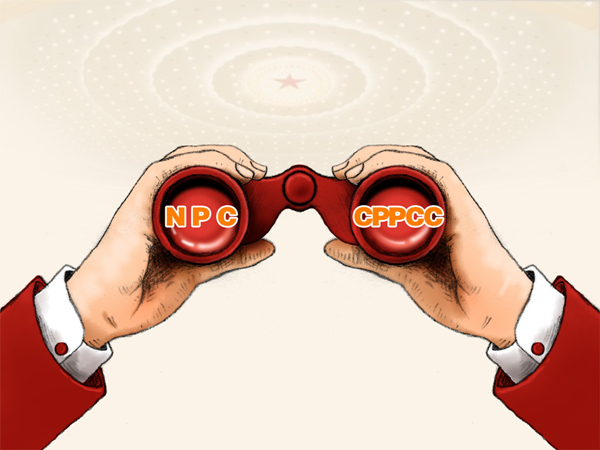China should launch an anti-corruption system
china.org.cn / chinagate.cn by Li Yongzhong, March 9, 2014 Adjust font size:
|
[By Zhai Haijun/China.org.cn] |
According to a recent survey conducted by China.com.cn, News360 and Wuxi Qingyan Investment Consulting Co Ltd, the fight against corruption is the issue the public are most concerned about in the ongoing sessions of National People's Congress (NPC) and Chinese People's Political Consultative Conference (CPPCC).
The result is evidence of the public's high expectation for China's anti-corruption transformation, which is expected to change sporadic campaigns into a sustainable institutional process.
In retrospect, the sudden astonishing collapse of the former Soviet Union 22 years ago can be attributed to the Communist Party's stratified official system and highly centralized power, which took congress, governments and surveillance bodies in one firm grip. Consequently, the party was alienated from the people and the country disintegrated overnight.
As I proposed before the 18th National Congress of the Communist Party of China (CPC), the new CPC Central Committee has to overcome three critical challenges -- the reform of political institutions, the polarized income gap and corruption. I suggested that anti-corruption drives which can gain considerable support from the public should be taken as the stepping stone for the overall reform.
According to Wang Qishan, the CPC Central Committee member in charge of the Central Commission for Discipline Inspection, the commission is battling with each single case of corruption in the hope of winning time for a fundamental change in the country's anti-corruption cause.
Last year, China took disciplinary actions against 182,000 corrupt Party members and government officials, grilled 21,000 officials for major safety accidents, and investigated 31 ministerial level officials suspected of violating laws and Party discipline.
It removed 18 officials at provincial and ministerial levels as well as 87,000 rural grassroots officials since the 18th CPC National Congress, showing the government's strong determination to fight corruption at all levels.
More significantly, according to the Decision made by the Third Plenary Session of the 18th Central Committee of the CPC which opened last November, the Party will enhance the supervision system among Party committees, especially standing committees. In my opinion, this point should be put under the spotlight because it means we are reforming from a dependent supervision system to an independent one. It demonstrates a different logic from the previous anti-corruption campaigns and it is good news for the cause.
In addition, the Eight Rules implemented at the end of 2012 by the Political Bureau of the CPC Central Committee ruled against formalism, bureaucracy, hedonism and extravagance among officials.
Since the implementation of the rules, the Party has exposed violators each quarter, and so far over 30,000 officials have been disciplined for breaking the rules.
After the nascent stage, we are now facing deeper reform -- to divide the power of the Party into three -- decision making, executive and supervisory powers. It may take five years to complete experiment in some counties and cities and the result will decide the ensuing nationwide reform in the following years.
To avoid the country becoming mired in the Tacitus Trap, in which the government loses all its credibility, we will have to take the opportunity after the two sessions to establish an anti-corruption system.
In the Third Plenary Session of the 18th Central Discipline Inspection Commission which closed a month ago, President Xi Jinping highlighted three new points for the anti-corruption cause. He said that we need to deepen reform, build an independent and authoritative supervision system and to set up a scientific system for the distribution of power, to battle with corruption.
It is easy to solve single cases of corruption, but to uproot it completely is very difficult. Therefore, we need to scrap the outdated Soviet Union model in which the Party committee and the Party chief at each level have supreme power, and guarantee the independence and authority of disciplinary inspection commissions at various levels, for the sake of the Party's long-term governance.
President Xi said that after 30 years of fighting corruption, we have eventually come to realize that corruption occurs not only due to person's lack of morality, but also because the operational mechanism of power and the structure of power are incomplete.
The author is an anti-corruption expert and part-time professor at the Chinese Academy of Governance.
The article was translated by Wu Jin. Its original unabridged version was published in Chinese.


